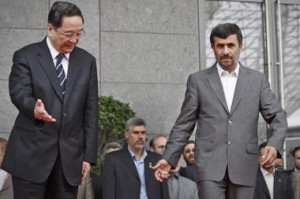Sunday
Jun272010
Shanghai Power Politics: China Shuts Out Iran (Shan Shan)
 Sunday, June 27, 2010 at 6:34
Sunday, June 27, 2010 at 6:34  Two weeks ago, the 10th Shanghai Cooperation Organization (SCO) Council summit, held in Tashkent, Uzbekistan, approved the SCO Rules of Procedure and the regulation on procedure for future membership expansion.
Two weeks ago, the 10th Shanghai Cooperation Organization (SCO) Council summit, held in Tashkent, Uzbekistan, approved the SCO Rules of Procedure and the regulation on procedure for future membership expansion.Before the summit, Chinese diplomats ritually pointed out that approval of the admission regulations was the first step in forming the basis for a future expansion of SCO membership and would serve as a cornerstone of the organization's rules for external links.
Behind this formality, however, was a more significant story: for now, Iran will not allowed to join the organisation.
The ostensible reason was that the SCO's regulations proscribe that “any country under UN sanctions cannot be admitted”. At the time of the meeting, Iran was subject to a 4th round of restrictions; a few days after the meeting, the UN Security Council passed yet another resolution.
Iranian President Mahmoud Ahmadinejad did not attend the summit, although he visited the Shanghai Expo and took part in celebrations at the Iranian pavilion on June 11. The Chinese Foreign Ministry maintained that Ahmadinejad was only visiting the country to attend the Expo, but analysts said he “is here to seek more support from China to water down fresh sanctions”.
The rejection of Iran's membership is far from the entire story, of course. The relationship between China and Iran is still stable. "There is no reason to control or weaken the relationship (with China)”, Ahmadinejad told a news conference after his visit to the Expo.
Moreover, this summit focused on economic cooperation and security issues in Central Asia, especially in Afghanistan, such as drug trafficking, terrorism ,and organized crime. Besides, the unrest in in Kyrgyzstan is another hot issue at this summit.
The fact remains, however, that Iran was kept at arm's distance. Zhang Xiao, deputy director-general of the Foreign Ministry's department of European and Central Asian affairs, indicated that the SCO is only considering the legal basis for expanding membership, indicating that there is a long way to go before formal accession will even be contemplated.
Furthermore, Beijing is more cautious than Russia, the other main power of the SCO. According to China Daily, Chinese President Hu Jintao told his Russian counterpart Dmitry Medvedev that SCO cooperation and exchange with outside countries should be done in a proper and stable manner, and on the basis of improving the strength of the bloc. "Blind expansion will spoil it (SCO) with excessive enthusiasm".
Pang Zhongying, a senior expert on world politics at Renmin University of China, assessed, "For a regional bloc, it is definitely not the more the better. Now the European Union has 27 members, and we can see more complex problems. The same reason also resulted in a loose APEC (Asia-Pacific Economic Cooperation forum). One of the approaches to ruin a bloc is encouraging it to admit more members."
Add the complicated situation in central Asia and the main concerns of the SCO, and it appears that Iran will be observing the group from outside for some time to come.
